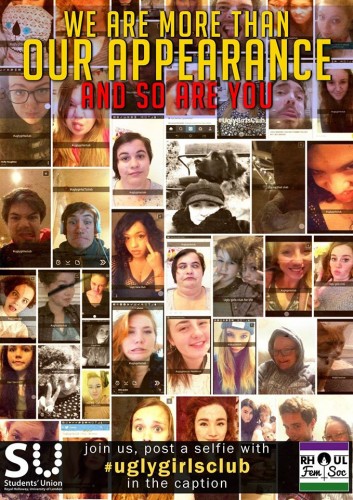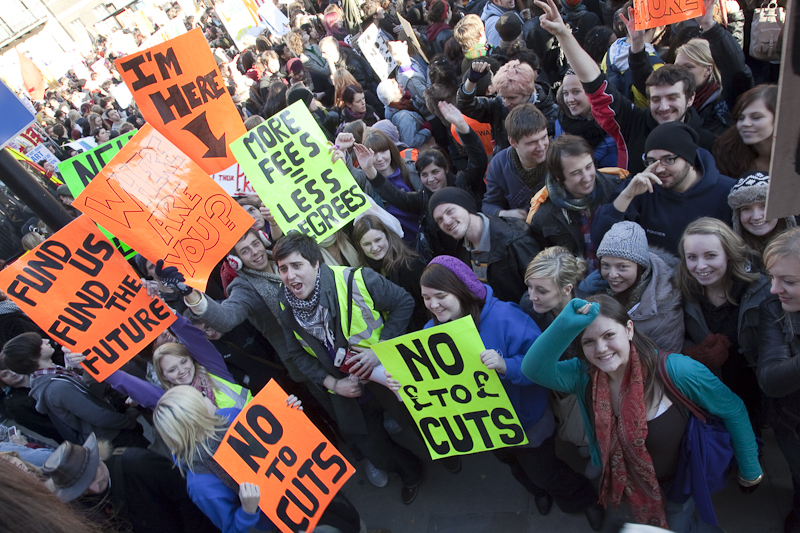What would you do if someone called you ugly? If you’re a member of Royal Holloway’s FemSoc, you start a viral selfie campaign. Victoria Rodrigues O’Donnell speaks to members of the so-called ‘Ugly Girls Club’ on the absurdity of beauty standards, lad culture, and starring in the Daily Mail’s ‘Femail’ section.
How did the campaign come about?
The campaign came about through FemSoc members snapchatting each other ironic selfies with the caption #uglygirlsclub after we had been referred to as the ‘ugly girls club’ whilst running a stall talking about consent at an SU night.
What made you decide to reclaim the rude comment in this way? Have you found it to be a successful message or one that girls, especially, are feeling pressured into taking part?
Reclaiming the mean things that people say about you has a particular way of taking the power out of them- once you own something it can’t really hurt you in the same way. Although the campaign has become so widely covered, it’s still entirely optional. We don’t demand or expect photos from anyone, and I don’t feel that pressure is an issue given that we don’t receive photos from an entire group in one go but from individuals one at a time.
The construction of ugliness as a result of conventional beauty standards is a tricky topic; would you say you’re being tongue-in-cheek or seriously challenging these conventions, or both?
The campaign started as very tongue-in-cheek, and we didn’t initially realise how successful it could be, so definitely. However once we saw people beginning to respond we were immediately aware of the strength of a message. It’s a very simple, light campaign which I think is why it works, but we aim to really make people consider the absurdity of conventional beauty standards given the variety of appearances in people. We’ve been misquoted as excluding conventionally ‘hot’ people but the core goal is to unite people seeing as very few people are entirely satisfied with their looks.
Although you’ve said in one interview that someone commented on how “[they’ll] never delete [their] unsatisfactory selfies again”, many girls (and guys alike) would still not do that even if they are happy with themselves; they would rather maintain an online ‘artifice’. What are your thoughts on this choice?
Despite a few misquotes and incorrectly angled articles, we would never seek to condemn anyone for wishing to keep up an online artifice. I believe everyone I’ve ever met has faced some insecurity in terms of appearance, and different people to different levels with different coping mechanisms. We haven’t asked people to forgo make-up or even pull an ‘ugly’ face; a lot of people simply just ran with this idea themselves. We never actually asked anyone to pull a certain face; the aim of the campaign is to inspire confidence in people’s individuality and their achievements rather than physical appearance. Therefore we acknowledge that confidence comes from comfortableness, the selfie idea has really come about as a sort of irony, so to us the presentation is irrelevant. The selfies are purely a signifier of someone declaring their solidarity with us and the campaign.
How do you feel about other universities forming their own Ugly Girls Clubs?
Exeter were the first to form a partner campaign via a friend of a student at Royal Holloway, Kate Noble. She began to publicise through Exeter’s Feminist Society when the campaign was only tiny. So seeing this sudden rush of support and the photos from students that came with it was just incredibly inspiring. It gave us a huge boost of confidence and I believe this is when it really took off! Since then we have heard from Bristol, Oxford, Cambridge, LSE, Goldsmiths, Durham, Brighton, Leeds, Leeds Beckett and many, many others, it is absolutely wonderful that feminist students can find support in each other across the country and even overseas. As a movement that often comes with criticism and spitefulness that can get quite upsetting and personal, this is perfect.
Can the campaign be viewed as a two-fingers-up at the years of ‘Lad Culture’ dominating campuses so long?
Lad Culture is incredibly relevant now as much as it has been for a long time, this is obvious seeing as NUS have recently launched ‘Reclaim Your Campus’, and ‘Sixteen Days of Activism’ as well as the ‘I Heart Consent’ campaign against Lad Culture. The work that has gone into these campaigns has been incredibly successful already, with so many societies, including men’s rugby completing workshops on the issues at Royal Holloway.
#UglyGirlsClub: El hashtag de “El Club de las Feas” http://t.co/mFyLB2fnvn pic.twitter.com/uQ5HIYn9Hb
— Telenews Noticias (@telenewsmex) December 15, 2014
What about the media coverage? Have you found it to be sufficient for expressing the society’s opinions or a pleasant surprise no one can be prepared for?
Honestly, both! Considering we never expected even local coverage it’s far more than sufficient. Each article or tweet just pushes the campaign further and therefore allows more exposure. Initially, the sudden explosion of attention was hard to deal with and I don’t think anyone can really prepare for that, particularly a group of unsuspecting students. However, it’s been a brilliant asset so far.
The coverage of the Ugly Girls Club on The Daily Mail was particularly amusing considering their infamy over the ‘Sidebar of Shame’. Any thoughts on that one in particular?
We’re grateful for and surprised by all of the media attention, and the more people involved in the campaign the better. However, the extreme irony of being put in the ‘Femail’ section along with gardening, babies and make-up made us laugh quite a lot! But, we’re happy our message is getting out there none the less.
Where will the RHUL Femsoc (or Ugly Girls Club now!) go next following this immensely popular viral campaign?
In terms of the society itself, we think it’s really important that going into the future, our members know that, despite all the press coverage our sessions are still a safe space. As for our future plans we have campaigns to work on for the Malala Fund and a campaign highlighting the sexism that women face in sport, so we are still going to be quite busy.
And in terms of the campaign, the success seems to have come from the simplicity of it so we have decided not to attempt to add anything or intensify the aims and messages. But we just hope the word will continue to spread and in doing so, continue to unite people against the pressure of conventional beauty standards and being judged on appearance. We hope it both raises awareness of the problems in our society and also inspires personal confidence.





These are some gooood questions Vicks!
I especially liked: ‘The construction of ugliness as a result of conventional beauty standards is a tricky topic; would you say you’re being tongue-in-cheek or seriously challenging these conventions, or both?’
I’m not convinced by the reply though.
Great job!!